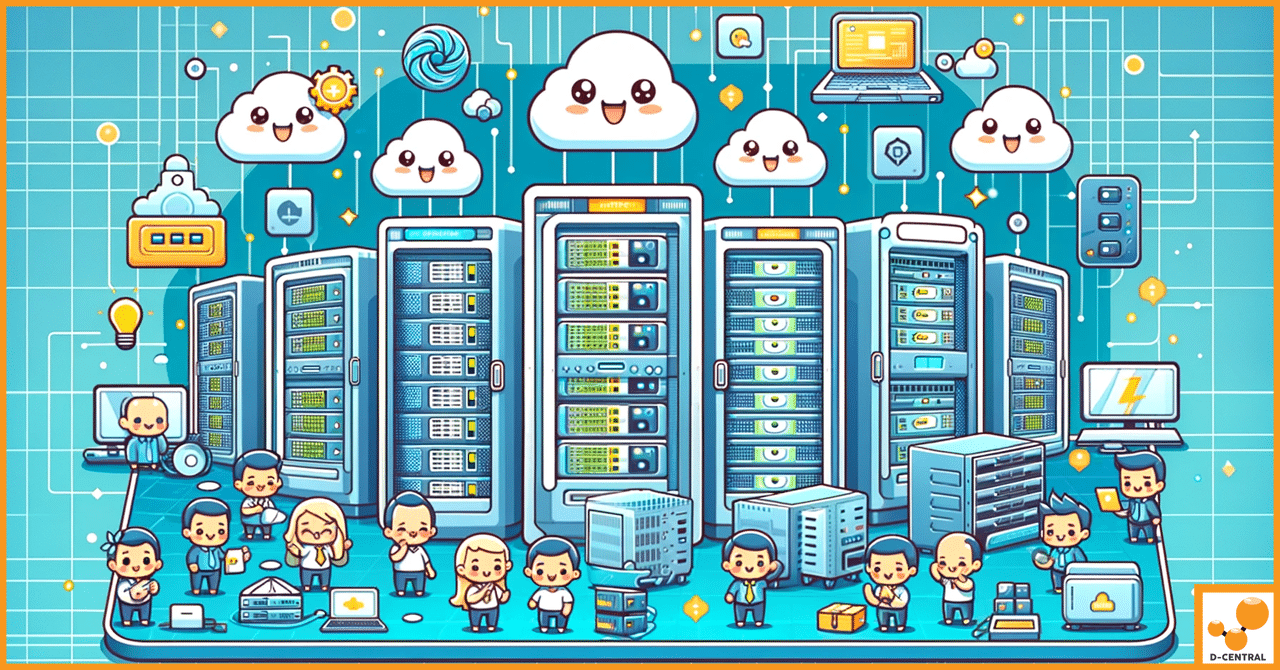
The Dawn of GPUtopia: A New Era for GPU Computing and AI Synergy
In the ever-evolving landscape of technology, the role of Graphics Processing Units (GPUs) has transcended beyond their original design for
4479 Desserte Nord Autoroute 440, Laval, QC H7P 6E2

Data centers have been the cornerstone of technological advancement, evolving significantly from the bulky, room-sized mainframes of the mid-20th century to today’s highly sophisticated, interconnected hubs. This evolution reflects broader technological shifts, from the mainframe and client-server models to the current era of cloud and edge computing. Each stage in this evolution has brought new demands for data processing capacity, energy efficiency, scalability, and security. Modern data centers are not just storage and processing facilities; they are dynamic environments that support a vast array of digital activities, from web hosting and cloud services to big data analytics and beyond.
In this landscape, colocation data centers have emerged as a pivotal model. Colocation, or ‘colo’, involves renting space for servers and computing hardware in a third-party facility. These data centers provide the necessary physical infrastructure – including space, power, cooling, and networking – for businesses to house their IT equipment. Unlike traditional data centers owned and operated by a single entity, colocation allows for multiple tenants to coexist, each with their dedicated or shared space. This model offers a blend of flexibility and cost-effectiveness, appealing to organizations that require advanced data center capabilities without the capital expenditure of building and maintaining a private facility.
While colocation data centers serve a broad spectrum of IT needs, it’s crucial to distinguish them from specialized facilities like Bitcoin mining farms and AI computing centers. Traditional data centers, as they stand, are often not suitable for Bitcoin mining. Bitcoin miners typically operate in hashcenters, mining farms, or mining facilities, which are designed to handle the immense power and cooling requirements unique to cryptocurrency mining. Similarly, AI computing centers are tailored to support the high computational demands of machine learning and data processing tasks. These specialized facilities share some similarities with data centers in infrastructure but are distinct in their design and purpose, catering to the specific needs of high-intensity computing tasks like Bitcoin mining and AI processing. This distinction highlights the diverse ecosystem of modern computing infrastructure, where different types of facilities coexist and serve varied technological needs in our digital and increasingly decentralized world.
Colocation data centers are specialized facilities that offer businesses and individuals the space to house their server and networking equipment in a secure, well-maintained environment, without the need to build and manage their own data center. These centers provide the necessary infrastructure, including power, cooling, physical security, and high-speed internet connectivity. Clients rent space within these facilities, which can range from a single rack to a large caged area, depending on their needs. The core concept of colocation is to provide a shared, yet secure, environment where multiple tenants can operate their hardware in a cost-effective and efficient manner. This model allows for economies of scale, as the operational costs of power, cooling, and connectivity are distributed among various users.
Historical Development and Comparison with Early Bitcoin Mining Facilities
The concept of colocation data centers emerged in the late 1990s and early 2000s, coinciding with the internet boom. Initially, they were developed to meet the needs of companies requiring reliable internet connectivity and off-site server storage. Over time, as technology advanced, these centers evolved to offer more sophisticated services, including cloud integration, disaster recovery, and enhanced security measures.
In contrast, early Bitcoin mining facilities, which began to appear in the late 2010s, were often makeshift setups in basements, garages, or spare rooms, using personal computing equipment. As Bitcoin gained popularity and value, mining evolved into a more industrial operation, leading to the creation of dedicated mining farms. These facilities are designed specifically for cryptocurrency mining, with a focus on maximizing computational power and energy efficiency, which are crucial for the profitability of mining operations. Unlike traditional colocation data centers, Bitcoin mining facilities often require much more power per rack and advanced cooling solutions to manage the heat generated by continuous, high-intensity computing.
Basic Structure: How They Operate and Serve Various Industries, Including Crypto Mining
Colocation data centers are structured to provide a secure, redundant, and high-availability environment. They typically feature:
For industries like crypto mining, while traditional colocation centers can provide some necessary infrastructure, the unique demands of mining operations often require more specialized solutions. These include higher power capacities, enhanced cooling systems to handle the heat generated by mining rigs, and often, locations where electricity costs are lower. As such, while colocation data centers serve a broad range of industries from IT to finance, and healthcare, the burgeoning field of cryptocurrency mining has given rise to more specialized facilities that cater specifically to the high demands of this sector.
Colocation data centers are designed to provide a robust and reliable infrastructure for hosting critical IT equipment. The key features include:
Network Infrastructure and Bandwidth Capabilities, with Nods to Bitcoin Mining Requirements
The network infrastructure in colocation data centers is designed to support high-density computing with significant bandwidth capabilities. This includes:
For Bitcoin mining, the network requirements are somewhat different. Mining operations prioritize low-latency connections for rapid block processing and high bandwidth for handling large volumes of mining data. While traditional colocation centers can meet these needs to an extent, Bitcoin mining facilities often require additional network customizations to optimize mining efficiency.
Security Measures: Comparing Physical and Cyber Security in Colocation Centers and Bitcoin Hashcenters
Security is a paramount feature in both colocation data centers and Bitcoin mining facilities, albeit with different focal points:
While there are similarities in the infrastructure and security measures of colocation data centers and Bitcoin hashcenters, the specific requirements of Bitcoin mining operations often necessitate specialized solutions, particularly in terms of power, cooling, and network infrastructure.
Colocation data centers can be broadly categorized into two types: retail and wholesale, each catering to different client needs.
Specialized Services: Managed Services, Disaster Recovery, and Bitcoin Mining Colocation
Colocation data centers also offer a variety of specialized services to cater to specific business needs:
The type of colocation data center and the range of specialized services offered are determined by the specific needs and scale of the client’s operations. From retail to wholesale colocation and specialized services like managed IT and disaster recovery, these centers provide flexible solutions to a diverse range of clients, including those in the emerging field of Bitcoin mining
One of the primary advantages of colocation data centers is their cost-effectiveness. By sharing infrastructure costs among multiple tenants, businesses can enjoy the benefits of a state-of-the-art data center without the hefty investment required to build and maintain their own facility. This shared model leads to significant savings on power, cooling, and connectivity.
Reliability and Uptime
Reliability and high uptime are critical for both traditional IT operations and crypto mining:
Access to Advanced Technology
Colocation data centers often house the latest in data center technology, offering clients access to advanced infrastructure:
Colocation data centers offer a range of advantages that are beneficial for a variety of IT needs, including the specialized requirements of Bitcoin mining operations. Their cost-effectiveness, scalability, reliability, and access to advanced technology make them an attractive option for businesses looking to optimize their IT and mining operations.
While colocation offers cost-effectiveness, businesses must carefully analyze their investment, especially when comparing colocation to private Bitcoin mining setups:
Remote Management Complexities
Managing IT infrastructure remotely in a colocation setting presents its own set of challenges:
Compliance, Legal Considerations, and Environmental Impacts
Colocation and Bitcoin mining must navigate various compliance and legal considerations, along with growing concerns about environmental impacts:
While colocation offers numerous benefits, businesses must carefully consider these challenges and responsibilities. A thorough cost-benefit analysis, effective remote management strategies, and a keen awareness of compliance, legal, and environmental factors are essential for successful colocation and Bitcoin mining operations.
The choice between traditional on-premises data centers and colocation can significantly impact large-scale Bitcoin mining operations:
Colocation vs. Cloud Computing: Relevance in the Context of Decentralized Currencies
Comparing colocation with cloud computing reveals different advantages and considerations, especially for decentralized currencies like Bitcoin:
Hybrid Models: Combining Colocation with Cloud Services for Diversified Mining Strategies
Hybrid models that combine colocation with cloud services are becoming increasingly popular, offering a balanced approach for Bitcoin mining:
In summary, each model – traditional on-premises, colocation, cloud computing, and hybrid – offers distinct advantages and challenges for Bitcoin mining. The choice depends on factors such as scale, control, cost, and the specific requirements of the mining operation. A nuanced understanding of these models is crucial for miners to make informed decisions that align with their strategic and operational goals.
The colocation industry has been witnessing significant growth, driven by increasing data demands and the rise of cloud computing. A notable trend within this sector is the burgeoning demand for Bitcoin mining colocation. This growth is fueled by the escalating interest in cryptocurrencies and the need for cost-effective, efficient mining operations. Bitcoin mining colocation offers miners access to the necessary high-power infrastructure, advanced cooling systems, and robust security measures, all of which are essential for profitable mining. As the value and popularity of cryptocurrencies continue to rise, so too does the demand for specialized colocation services that cater specifically to the needs of crypto miners.
Technological Advancements: Impact on Colocation Services and Crypto Mining Efficiency
Technological advancements are continuously reshaping the colocation landscape:
Future Challenges and Opportunities, Including Sustainability in Bitcoin Mining
Looking ahead, the colocation industry faces several challenges and opportunities:
The colocation industry is poised for continued growth and transformation, particularly in the realm of Bitcoin mining. The sector must adapt to technological advancements, sustainability concerns, and regulatory changes, all while seizing the opportunities presented by the evolving digital landscape.
Colocation data centers have become integral to the fabric of the modern digital landscape. They provide a critical infrastructure that supports a wide range of IT needs, from traditional business operations to the burgeoning field of cryptocurrency mining. As the digital world continues to expand and evolve, the role of colocation centers becomes increasingly significant. They offer the flexibility, scalability, and advanced technological infrastructure necessary to meet the growing demands of data processing and storage.
In the specific context of the crypto landscape, colocation data centers have emerged as pivotal players. They address the unique challenges of Bitcoin mining, such as the need for high-power capacity, advanced cooling systems, and robust security measures. By offering specialized services tailored to the needs of crypto miners, colocation centers enable more efficient, cost-effective, and sustainable mining operations. This symbiotic relationship highlights the adaptability of colocation centers to emerging technological trends and their ability to meet specialized requirements.
Looking to the future, colocation data centers are poised to continue their growth trajectory. The increasing reliance on digital technologies, coupled with the continuous evolution of the internet and cloud services, will drive demand for colocation services. Additionally, as the interest in cryptocurrencies and blockchain technology grows, so too will the need for specialized colocation services that cater to the crypto-mining community.
Sustainability will be a key focus, with colocation providers expected to adopt more environmentally friendly practices, such as using renewable energy sources and implementing more efficient cooling technologies. This shift is particularly relevant for Bitcoin mining, which faces scrutiny over its environmental impact. Colocation centers that can offer sustainable mining solutions are likely to gain a competitive edge.
Innovation will also play a crucial role in the future of colocation centers. Advancements in AI, machine learning, and blockchain technology will offer new opportunities for enhancing data center operations, security, and efficiency. For Bitcoin mining, this could mean more sophisticated and automated management of mining operations, leading to higher efficiency and profitability.
In conclusion, colocation data centers are not just keeping pace with the digital and crypto revolutions; they are at the forefront, enabling and empowering these advancements. As the digital landscape continues to evolve, colocation centers will undoubtedly adapt and innovate, playing a crucial role in supporting the next generation of digital and crypto technologies.
What are colocation data centers?
Colocation data centers are specialized facilities that allow businesses and individuals to rent space for servers and computing hardware. They provide necessary infrastructure such as space, power, cooling, and networking.
How have colocation data centers evolved?
Colocation data centers emerged in the late 1990s and have evolved to offer sophisticated services, such as cloud integration, disaster recovery, and enhanced security measures.
What is the difference between a colocation data center and a Bitcoin mining facility?
A colocation data center serves a broad range of IT needs and provides shared infrastructure for multiple tenants. A Bitcoin mining facility is designed specifically for cryptocurrency mining, with a focus on maximizing computational power and energy efficiency.
What type of clients use retail colocation services?
Retail colocation is ideal for small to medium-sized businesses or individual departments of larger organizations that require smaller spaces like a single rack or a cabinet.
What is wholesale colocation, and who uses it?
Wholesale colocation is suited for large enterprises or organizations with extensive IT infrastructure needs. These clients lease large spaces, often entire floors or dedicated buildings, and manage their own equipment.
What specialized services do colocation data centers offer?
Colocation data centers may offer managed IT services, disaster recovery solutions, and specialized services for Bitcoin mining that include high-density power and advanced cooling systems.
What are the main benefits of using colocation data centers?
Colocation centers provide cost-effectiveness, scalability, reliability, and access to advanced technology. They are beneficial for a variety of IT needs, including the specialized requirements of Bitcoin mining operations.
What challenges do businesses face with colocation?
Businesses must consider the costs, energy efficiency, remote management complexities, and compliance and legal issues, especially when involved in energy-intensive operations like Bitcoin mining.
How does colocation compare to cloud computing for Bitcoin mining?
Colocation offers more control over hardware and predictable costs, while cloud computing provides flexibility but can have variable pricing. Performance consistency is more assured with colocation.
What are the industry trends and future of colocation data centers?
The colocation industry is growing, driven by increasing demands for data processing and the rise of cloud computing. Future trends include sustainability initiatives, regulatory compliance, and service innovation, particularly for Bitcoin mining colocation.
DISCLAIMER: D-Central Technologies and its associated content, including this blog, do not serve as financial advisors or official investment advisors. The insights and opinions shared here or by any guests featured in our content are provided purely for informational and educational purposes. Such communications should not be interpreted as financial, investment, legal, tax, or any form of specific advice. We are committed to advancing the knowledge and understanding of Bitcoin and its potential impact on society. However, we urge our community to proceed with caution and informed judgment in all related endeavors.
Related Posts

In the ever-evolving landscape of technology, the role of Graphics Processing Units (GPUs) has transcended beyond their original design for

In recent years, the world has witnessed a seismic shift towards digital currencies, with cryptocurrencies like Bitcoin leading the charge.

Antminers, developed by Bitmain, stand at the forefront of cryptocurrency mining technology. These specialized devices, known as Application-Specific Integrated Circuits